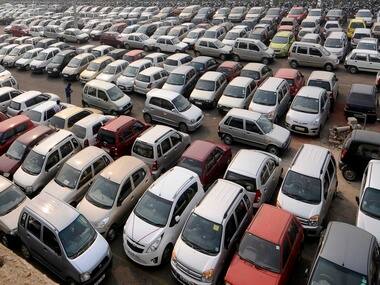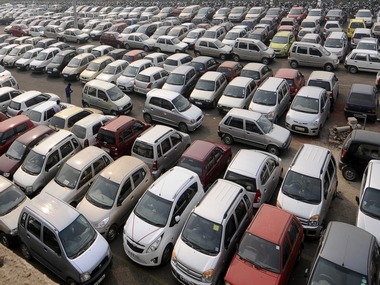The government is likely to end the excise duty concessions to cars, two-wheelers and SUVs by 31 December, according to a
PTI report
that quotes an unnamed finance ministry official. High time. In an infrastructure-short country, the last thing to do is to ask people to buy cars and SUVs on the cheap without building adequate roads for them. But even putting this broad issue aside, the fact is the auto industry no longer needs crutches when the cost climate is moving in its favour decisively. [caption id=“attachment_1969755” align=“alignleft” width=“380”]
 Reuters Image[/caption] Duty rates were cut to 24 percent from 30 percent and 27 percent for SUVs and large cars, respectively, in the UPA’s interim budget for 2014-15. Rates were cut to 20 percent for mid-sized cars. The incoming NDA government continued the concessions till 31 December. Now, it appears, the rates will spring back to their old levels. So, from 1 January 2015, auto makers will probably raise some prices. But if they want to keep sales up in the early part of next year, they should absorb some part of the duty increase themselves. As usual, the industry has been pleading for a continuation of the relief – though it does not deserve it. Maruti Suzuki Chairman RC Bhargava has said that if the incentives are not continued, automobile prices would go up. But this is scare-mongering. Not only have auto sales this year been robust, being up 10 percent in the April-November period, but the future looks better too. Consider all the positive trends that are likely to help the auto industry in the near future. #1: Fuel prices have moved down significantly, especially in petrol. This more than makes up for any small rise in product prices from 1 January. The Indian psyche is about running costs, and so the higher capital costs of vehicle ownership will not be a deterrent to sales growth. #2: The yen has fallen by nearly 10 percent and the euro by nine percent against the rupee in 2014. This means all Japanese and European cars that import components from back home or from Europe will find their costs competitive even after the excise hike. So there is no reason why Maruti, Toyota, Honda or Volkswagen should not absorb a part of the excise hike since they gain from cheaper import of components. #3: Given the general decline in wholesale prices inflation (the WPI was zero in November, and will probably be in low single digits in the first half of next year), and excess capacities in the ancillary industry, the auto industry’s local costs too will be in check. #4: We are looking at a falling interest rate scenario from April next year. This means car financing costs will also start falling. The auto industry should be just fine without duty crutches. If you allow it to keep the crutches for too long, it will refuse to walk again without them. At some point from mid-2016, once the goods and services tax kicks in, it will gain further from the efficiencies. So, if Arun Jaitley has finally decided to end the duty bonanza, he is on to a good thing. The last thing the country needs is special treatment for private vehicles when the focus should be on public transport.
Reuters Image[/caption] Duty rates were cut to 24 percent from 30 percent and 27 percent for SUVs and large cars, respectively, in the UPA’s interim budget for 2014-15. Rates were cut to 20 percent for mid-sized cars. The incoming NDA government continued the concessions till 31 December. Now, it appears, the rates will spring back to their old levels. So, from 1 January 2015, auto makers will probably raise some prices. But if they want to keep sales up in the early part of next year, they should absorb some part of the duty increase themselves. As usual, the industry has been pleading for a continuation of the relief – though it does not deserve it. Maruti Suzuki Chairman RC Bhargava has said that if the incentives are not continued, automobile prices would go up. But this is scare-mongering. Not only have auto sales this year been robust, being up 10 percent in the April-November period, but the future looks better too. Consider all the positive trends that are likely to help the auto industry in the near future. #1: Fuel prices have moved down significantly, especially in petrol. This more than makes up for any small rise in product prices from 1 January. The Indian psyche is about running costs, and so the higher capital costs of vehicle ownership will not be a deterrent to sales growth. #2: The yen has fallen by nearly 10 percent and the euro by nine percent against the rupee in 2014. This means all Japanese and European cars that import components from back home or from Europe will find their costs competitive even after the excise hike. So there is no reason why Maruti, Toyota, Honda or Volkswagen should not absorb a part of the excise hike since they gain from cheaper import of components. #3: Given the general decline in wholesale prices inflation (the WPI was zero in November, and will probably be in low single digits in the first half of next year), and excess capacities in the ancillary industry, the auto industry’s local costs too will be in check. #4: We are looking at a falling interest rate scenario from April next year. This means car financing costs will also start falling. The auto industry should be just fine without duty crutches. If you allow it to keep the crutches for too long, it will refuse to walk again without them. At some point from mid-2016, once the goods and services tax kicks in, it will gain further from the efficiencies. So, if Arun Jaitley has finally decided to end the duty bonanza, he is on to a good thing. The last thing the country needs is special treatment for private vehicles when the focus should be on public transport.
Excise duty concessions for auto sector to go: Jaitley is right to remove industry's crutches
R Jagannathan
• January 20, 2015, 18:12:40 IST
The auto industry has got more than its fair share of duty relief this year. It is good if Arun Jaitley ends the duty concessions on 31 December.
Advertisement
)